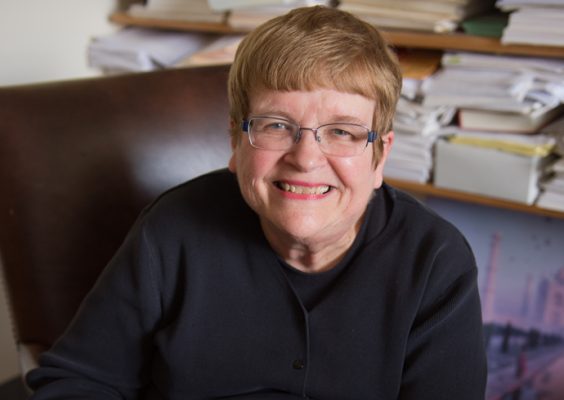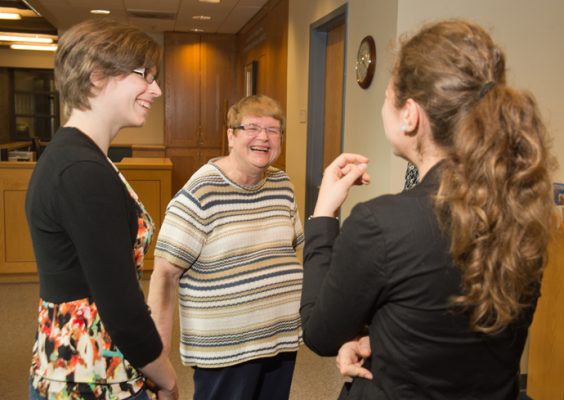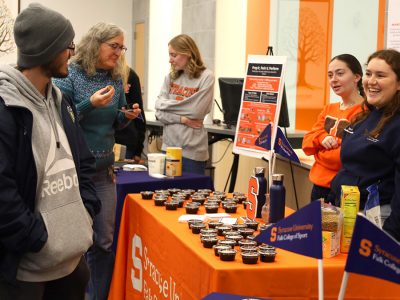Margaret ‘Peg' Hermann, the Moynihan Institute’s Longtime Leader, Retires
The late U.S. Senator Daniel Patrick Moynihan once said, “If I were 26 again, I would be out in the world working with others on problems that no one country can solve on its own.”
His words encapsulate the mission of the Moynihan Institute of Global Affairs and the team approach to problem-solving that served as a guide for Margaret “Peg” Hermann in her nearly 20 years at its helm.
“The Institute programs involve young people who are going to shape our world in the future,” says Hermann. “In today’s world, that means learning about governance with a mind to the other countries and governments around us. I always felt honored to be part of that mission.”

Hermann retired at the start of the spring semester and became professor emerita of political science.
She first joined the Maxwell School as a professor of political science in 1998. A year later, she was named a Gerald B. and Daphna Cramer Professor of Global Affairs, and in 2000 she took the helm of what was then known as the Global Affairs Institute (GAI).
At the time, GAI was home to two regional centers: The South Asia Center and the Program on Latin America and the Caribbean (PLACA). Hermann made it her mission to promote community and collaboration as well as to provide support to faculty doing international and comparative research.
Hermann and GAI got a boost when the Maxwell School received a $10-million endowment from Congress to rename the institute for the late senator. The ribbon-cutting ceremony in March 2005 was attended by dignitaries including senators Charles Schumer and Hillary Clinton, Congressman Charles Rangel and NBC newsman Tim Russert, a former member of Moynihan’s staff.
Today, the Moynihan Institute boasts seven multidisciplinary regional centers and six problem-focused research working groups. All collectively serve as a University focal point for internationalization and global engagement.
Brian Taylor, professor of political science and Hermann’s successor at Moynihan, says he has long admired her work to increase global understanding and a multidisciplinary approach to problem-solving.
“Peg has worked tirelessly to realize the institute’s mission: ‘to support scholarship, training and practice in global affairs and to carry on the public and intellectual traditions of Senator Moynihan,’” says Taylor. “More than any person on campus over the last two decades, she has fostered the development of multidisciplinary regional studies centers and programs.”
Indeed, the institute has administered grants worth millions of dollars during Hermann’s directorship, most recently securing $1.05 million for the South Asia Center.
“I’m really proud of these regional centers and programs and the important work on real-world problems they allow faculty and students from across the University to do,” says Hermann. “Without the support of the Moynihan Institute, they might not exist.”
Hermann also has helped the institute launch multidisciplinary research working groups that have resulted in books, special journal issues, and policy papers as well as speaker series.
At the same time, Hermann has earned an international reputation for her own scholarship. A pioneer in the field of political psychology, she developed the Leadership Trait Analysis assessment-at-a-distance tool that uses leaders’ speeches and interviews to understand their style and, in turn, what they are likely to do. She has compiled a dataset of over 500 leadership profiles of heads of state and insurgent/terrorist leaders, and she has trained leadership analysts in the intelligence and defense communities.
Hermann regularly shared her knowledge in Maxwell’s multidisciplinary master of arts in international relations program.

“Peg Hermann is responsible for training hundreds of students in foreign policy, crisis management and leadership through her courses and serving as an important mentor, supporter and adviser to many throughout their time at Maxwell and throughout their careers,” says Colleen Heflin, associate dean, professor and chair of public administration and international relations.
One of these is Heidi Stallman, who was first exposed to Hermann’s work as a sophomore taking a political psychology course at Washington State University. Stallman wrote her undergraduate thesis using tools crafted by Hermann and is now a Maxwell political science doctoral student studying rebel governance and women leaders in rebel groups.
“Peg has been integral in helping me challenge dominant gender norms in the variety of disciplines that I engage with,” says Stallman. “Though a majority of her work does not focus on gender, her work is always inspired by her experiences in academia as a woman, and her commitment to gender-informed research.”
While Hermann has served as a mentor to all students, it is indisputable that she has served as a role model to decades of women pursuing careers in political psychology and international relations.
Hermann grew up in Lexington, Kentucky. Her father was a professor of sociology and her mother, a high school biology and chemistry teacher. She never had her father as a teacher, but she did have her mother for two semesters, and soaked up her love of her subject matter and teaching as well as her ability to carry her own in disciplines that were often taught by men.
Hermann attended DePauw University in Greencastle, Indiana, where she has since received an honorary doctorate. Upon graduating from DePauw, she received a Ph.D. in psychology from Northwestern University, followed by a postdoctoral fellowship in the Personality Research Group at the Educational Testing Service.
Her first faculty position was as a visiting lecturer in psychology at Princeton University—she was one of only four women teaching at what was then an all-male institution. “The young men didn’t know what to make of a female professor,” she recalls.
Then, as a research associate at Ohio State’s Mershon Center, Hermann recalls, “My salary depended on bringing in grants.”
She became adept at it, securing $2 million from the National Science Foundation to build a nationwide research training group around leadership and group decision making that included launching a summer institute in political psychology. Maxwell political scientists Stuart Thorson and Matthew Bonham were part of the training group and recruited Hermann to become a colleague at Syracuse.
The author or editor of 11 books and over 100 academic, technical and policy papers, Hermann was the first woman to serve as president of the International Society of Political Psychology, the fourth woman president of the International Studies Association, and founding editor of two journals, Political Psychology and International Studies Review.
At Syracuse, she has received two Outstanding Teaching Awards from the master’s in international relations program and the William Wasserstrom Prize for Graduate Teaching. In 2004, she received a Chancellor’s Award for Exceptional Academic Achievement.
Though retired, Hermann is still visible at Maxwell as she completes grant projects and attends Moynihan Institute events.
“Peg Hermann has made an indelible impact in her time at Maxwell, influencing generations of students as a mentor and teacher and greatly expanding the work of the Moynihan Institute, and therefore our global impact,” says Dean David M. Van Slyke. “We celebrate her well-deserved retirement—and we’re pleased that she continues as a member of the Maxwell community.”



